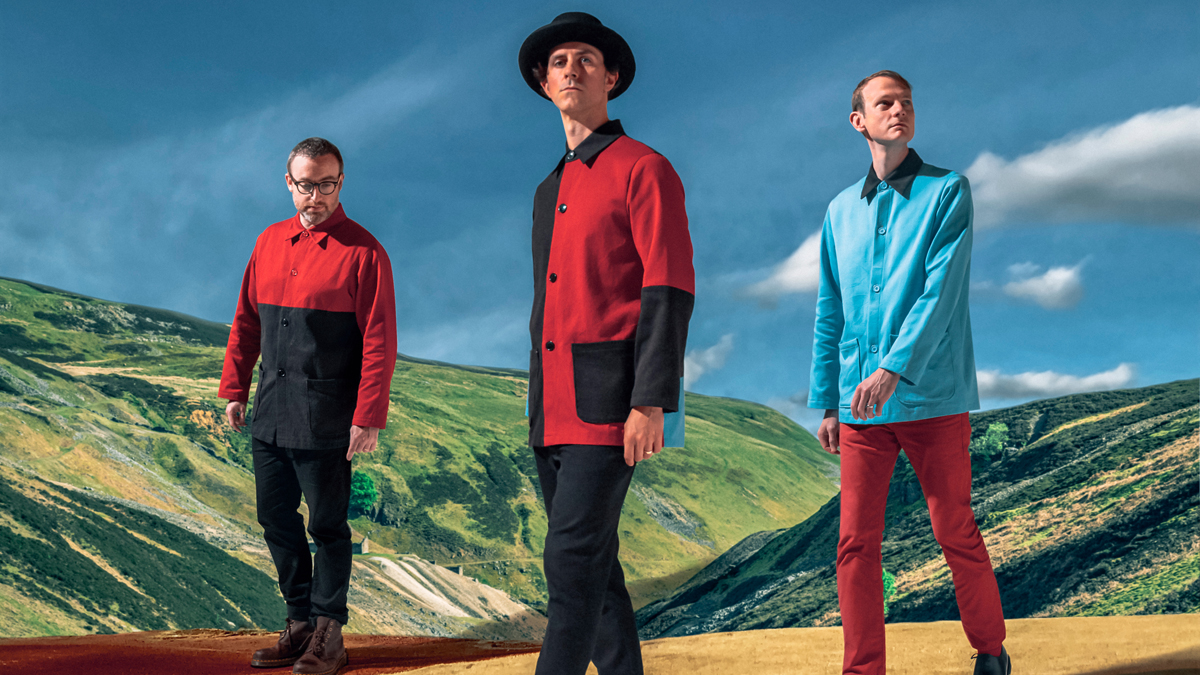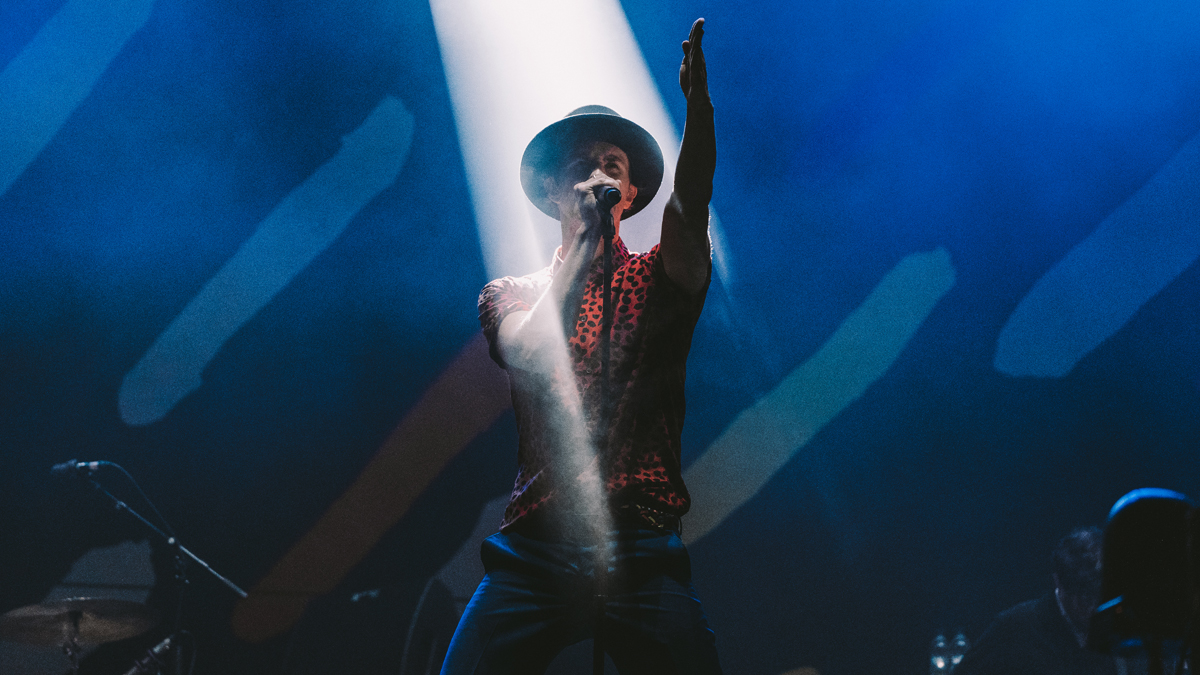Maximo Park’s Paul Smith on making their new album remotely: “I recorded the vocals in GarageBand in my loft”
“I feel grateful that we’ve made this record, but the idea of making music as a group and coming up with ideas on the spot isn’t something we’d want to sacrifice going forward”

Want all the hottest music and gear news, reviews, deals, features and more, direct to your inbox? Sign up here.
You are now subscribed
Your newsletter sign-up was successful
In the run up to the release of Maximo Park’s seventh album, Nature Always Wins, the alternative rock group welcomed Grammy-winning producer Ben Allen to Tyneside to make big plans.
Already reeling from the departure of key member Lukas Wooller, the pandemic struck, forcing the trio of Paul Smith (vocals), Duncan Lloyd (guitar/keyboards) and Tom English (Drums) to rethink their entire strategy.
Through adversity came opportunity. Wooller’s departure enabled the band to explore a more avant-garde approach. However, the band also had to wrestle with lockdown by playing their parts in isolation and bouncing audio files to Allen 4,000 miles away in Atlanta, Georgia.
Thankfully, a somewhat painstaking and laborious process evolved and has yielded one of the band’s most memorable and satisfying albums to date. We spoke to Paul Smith about its chaotic making...
I’m guessing the title Nature Always Wins refers to the power and control nature commands over all of us?
“It comes from a song on the album called Child of the Flatlands. I’d gone for a walk around the area I grew up in - a small town called Billingham in the North East, which was a heavily industrialised area, and still is to an extent, but has lain dormant for years. Nature has fought back, which can be seen in the way that it slowly pushes through the cracks in the pavement and ends up winning out a lot of the time. That also made me think about other lyrics on the record that were influenced by parenthood and our true human nature, and whether that wins out, too.”
So not necessarily related to the pandemic?
Want all the hottest music and gear news, reviews, deals, features and more, direct to your inbox? Sign up here.
“The idea of us as a human race being humbled by nature, whether due to a natural disaster or something slower like climate change, was buzzing around my mind, but by the time we’d decided what the album would be called the pandemic came along and gave it another meaning altogether.”
I guess you initially thought the album would be made like most of your others, with everyone jamming together in a room?
“We’re usually in the studio for three to four weeks and this time we were due to go out to Atlanta to make the record with producer Ben Allen. He’d already come over for some meetings in London and put together a plan of action; then we paid for him to take a trip to Newcastle to work on some songs and that enabled us to put our trust in him. Without wanting to sound big-headed, that had a real effect on how good we believe the record is.”
You also had to wrestle with original member Lukas Wooller deciding to relocate to Australia?
“When Lukas left we knew we’d reached a crossroads. Even though it was sad it became an opportunity for us to do something that sounded a bit different. We were planning to fly over to Ben, swap instruments and make something interesting, but obviously that couldn’t happen so we asked him whether there was a way to make the record remotely.”
What were your immediate concerns?
“Sending files to Ben in different time zones and speaking via WhatsApp, which was nowhere near what we were expecting. We wondered whether it would all sound a bit too fragmented.
“The songs that we’d already recorded were quite varied - it’s almost like they comprised 10 or 12 different styles, so I feel really grateful to Ben that his expertise and musicality worked without us being there in person.
“It was a bit of a gamble, but it’s undoubtedly paid off because the album sounds quite widescreen and different to our other stuff, which is exactly what we want to achieve with each record. ”
Singing on an almost final track is inspirational because you feel like you’re putting the icing on the cake, but because I’m a luddite I had to keep track of my tuning because I can’t monitor myself on my headphones very well.
Is it true that Ben set a challenge for you to write 40 songs?
“He certainly did. We had 15 really solid songs and another 5 that we were wondering what to do with, but Ben asked us to write around 40 so we could push ourselves into different territories and see what came out.
“At first we wondered if he liked our music, but from generating all of those ideas we did get a few extra tracks that we can put on an EP or our next record. I personally enjoyed the challenge - as a group we liked the idea of a gauntlet being thrown down and having two months to write another 20 songs.”
With each of you working remotely, how did the writing process develop?
“We developed a reliance on Duncan’s demos; then I’d come back with a vocal melody and a finished lyric and ask if it’s going in the right direction.
“Once we’d finished a song we’d send it to Tom who eventually went into a studio in Liverpool and recorded his drums with an engineer, socially distanced behind glass, and Ben on a laptop listening through some sort of strange app that would broadcast everything in real-time back to Atlanta.
“We actually did the same with our guest vocalist Pauline Murray. I was on a FaceTime call with her husband Rob, who’s an engineer, and Ben was also on hand to give his expert production advice.”
How did Duncan record his guitar and keyboard parts?
“I’m fairly ignorant of his methods because he records a lot of solo stuff at home anyway, but I know he used a Fender Jaguar guitar on the record and a Juno synth on the track Meeting Up. He would send over his guitar parts and Ben would re-amp them in his studio, put pedals on them, add synth stuff or take some of his synth and piano work and add effects to them.
“Duncan did a lot of bass recordings on the record, too, and Ben would redo them if he felt he could add something. It was all about making blueprints and templates out of the raw material we were working with. “

At what stage were your vocals added to the mix?
“ I was always receiving an up-to-date mix, so once the drums were done and a track was almost finished it became time to lock my vocals in rather than use the rough demo vocals.
“Singing on an almost final track is inspirational because you feel like you’re putting the icing on the cake, but because I’m a luddite I had to keep track of my tuning because I can’t monitor myself on my headphones very well.
“Also, because I hadn’t sung for a long time, my lower register was gradually eroded by the force of my higher register. You’ll find at our concerts that the set list is weighted towards the lower registered stuff at the start because by the end I’m always shredding the vocals a bit.
You recorded your vocals in your loft at home. Presumably that was that a new experience?
“I’m not a technical person so it was all a little bit on the edge. I knew the room was echoey after doing a lot of Zoom calls in there, so I just tried to point in the right direction.
“I ended up using a Neumann mic that Duncan left on the doorstep before he scooted away [laughs] and recorded the vocals through GarageBand with a Focusrite Scarlett interface. For a song like All of Me, Ben would say he needed a little bit more attitude or energy because the verse is quiet and intimate, but then it would take 24 hours to receive that feedback so it was quite a long and drawn out process.”
Overall, was working independently of each other easier than you expected?
“We mixed our third album Quicken the Heart over iChat and it was rubbish because the line kept breaking up. That was at the tail end of 2008, so using split-screen calls on WhatsApp as our main method of communication was much easier this time.
“To send the files over we’d primarily use Dropbox and sometimes WeTransfer, and that would have been much more difficult 10 years ago. It amazed me how good the parts sounded in the mix, which was also a really laborious process because we’d get really pernickety and change half a dB here or there without even being in a room together.”
Comparing Nature Always Wins to your previous albums, do you think the process behind its creation gives it a unique sound?
“ Being so close to the project it’s sometimes hard to see the wood for the trees, but it’s probably a more disciplined record than we may have made. Thanks to Ben, I think the album’s really smooth and spotless but also contains that grain of the homemade that it needs to give it an authentic edge.
“I feel grateful that we’ve made this record, but the idea of making music as a group and coming up with ideas on the spot isn’t something we’d want to sacrifice going forward.”
Maximo Park’s Nature Always Wins is out now on Prolifica Inc. Tickets for new shows, with the band performing songs from Nature Always Wins plus second album Our Earthly Pleasures in its entirety, are also available.